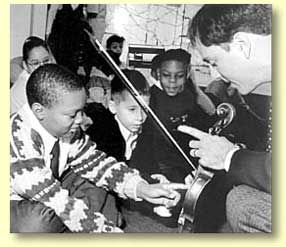Arts in Education
- Caring for Our Audiences Young and Old
 Caring for Our Young Audiences Caring for Our Young Audiences
Four
Nations has developed the Arts in Education program to respond to the
need for attractive and interactive arts programming and to help nourish
students' need for art in our time, in which most administrators and politicians
feel that the arts are unnecessary ornaments. For
the last ten years, The Four Nations Ensemble has worked with selected
schools in New York City and around the country. The trio, in cooperation
with teachers, creates festivals of music, poetry, art and history. Concerts,
art workshops, explorations of life in the Baroque era, exercises in writing
prose and poetry, and projects that use skills of math and language enhance
and enrich both the students' and teachers' work. Festivals
of the arts can be focused around an historical period (Music and young
America), an aesthetic period (early Romanticism), a personality (Juana
Inez de la Cruz or Beethoven) or a structural issue (variations, sonatas).
Connections are made between all the arts while students write original
poetry and paint images in an effort to translate sound into image and
word. Each
member of the Four Nations Ensemble is committed to spreading the messages
and joy of great art to young men and women, and our concerts for students
are prepared with the same attention as performances for our most discriminating
audiences. Only by hearing interpretations of integrity and intensity
will classical music become necessary experiences for new audiences. "To
see three hundred children every morning listening in rapt silence
to Baroque music is a sight to behold. Four Nations reminds us that
it is easy to underestimate the children we teach. It was music that
created this awareness."
Jane Oxton, School Arts Coordinator, St. Cloud,
MN
Arts in Education
- College and University Residencies
The
Four Nations Ensemble has developed special relationships with colleges
and universities throughout the country. Each school demonstrates a different
personality with varied needs and the Ensemble responds with programs
tailored to differing levels of experience and interest. Our
programs range from professional workshops in performance practice to
lecture demonstrations connecting classical music to larger humanities
studies. Programs illuminating relationships between great writers (Shakespeare
and Donne), painters (Goya or Rembrandt), and important events in scientific
or social history (Galileo, the French Revolution) make music a vivid
illustrator of our cultural past. A working and familial relationship
has developed between the musicians of the Ensemble and faculty members
at the residency schools which enriches Four Nations' work on campus and
throughout the community.
For
its work with Arts in Education and universities, The Four Nations Ensemble has
enjoyed funding from Chamber Music America, The Presser Foundation, The
J. M. Kaplan Fund, The Ruth and Gerald Dickler Foundation, The Herman
Goldman Foundation, the New York State Council on the Arts, and the National
Endowment for the Arts.
Pre-Concert Talks - Breaking Down The BarriersPre-concert
talks are an integral part of a Four Nations concert. The music at hand
is placed in context through allusions to society, history, art and literature.
Humorous and sometimes shocking anecdotes convey serious and illuminating
information. Andrew Appel, artistic director of the ensemble, challenges
the audience with questions and signposts that direct the attention of
each listener and enhance his or her enjoyment of the repertoire. A
chamber music concert by The Four Nations Ensemble is not meant to feel
like a presentation of a virtuoso in isolation. Chamber music is about
interaction, about an exchange of ideas. In educational, amusing and non-didactic
pre-concert discussions, relationships are drawn between the less familiar
world of music and the more commonly known arena of literature, art, and
history. Information and issues are brought to the fore in order to focus
the audiences' attention on savory and remarkable aspects of the music
and to make clear the relationships that exist between every piece on
the program. Unlike
the audiences of the past, all of whom played instruments and knew the
issues of structure and technique, today's audience responds to and benefits
from information as an aid to appreciation and pleasure.Turning the concert
hall into the music room and the artists into guests and friends is one
challenge to today's musicians, and one that The Four Nations Ensemble
enjoys.
|